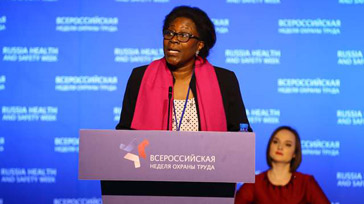Russian Federation Health and Safety Week
ILO calls for strengthened investment in workers’ safety and health
The International Labour Organization (ILO) highlights the need to scale up prevention to ensure a safe and healthy workplace and fight the HIV epidemic.

Addressing the plenary session of the second All-Russia Occupational Safety and Health (OSH) Week in Sochi, Ouédraogo, reminded the audience that every 15 seconds a worker dies from a work-related accident or disease at the global level.
According to the ILO, every year more than 2.3 million workers die at work, while another 317 million workers suffer from work-related accidents. The economic burden of poor OSH practices in workplaces has been estimated to represent 4 per cent of global Gross Domestic Product each year.
“To take action and ensure a safe and healthy working environment, will positively influence enterprises and economies. Any cost spent to make the working environment safe and healthy should be seen as an investment rather than an expenditure,” she said.
The ILO has adopted more than 40 international labour conventions and recommendations specifically dealing with occupational safety and health, as well as over 40 codes of practice. Theses codes and standards not only contribute to the improvement of working conditions for all workers, but also aim at creating global awareness of occupational safety and health (OSH) issues and supporting practical action at all levels.
In this regard, Ouédraogo noted the commitment made by the BRICS health ministers in 2015 calling for enhanced cooperation on health goals and reflecting the importance the Russian Federation gives to investment in OSH.
Ouédraogo also made a strong call for prevention to stop the HIV epidemic: “It is estimated that 37 million people are living with HIV in the world, with half of them not knowing about their HIV status”. According to the Russia National Statistics Center, the number of new HIV infections continued to rise in the Russian Federation.
In this context, she noted the strong national political support for a multisectoral approach addressing the epidemic which was expressed during the fifth Eastern European and Central Asian AIDS Conference (EECAAC) held in March this year in Moscow. The ILO expert also mentioned the role which the ILO and its Russian partners played with respect to the outstanding results of the Voluntary Confidential Counselling and Testing (VCT@WORK) Initiative during 2015.
The initial engagement of the Siberian Coal Energy Company (SUEK) has established a national role model for the engagement of Employers and workers in the VCT@WORK Initiative. As a result of the national broad alliance which emerged from critical partnerships between the Social Partners and the Government, HIV awareness information reached out to around 155,000 workers, their families and communities in ten territories. Over 100,000 workers undertook HIV testing, including 400 who were found positive and provided with referral services to access treatment, care and support measures.
The annual Russian Federation Health and Safety Week is a global discussion forum on the latest trends and prospects in advancing occupational safety and health, promoting safe working conditions and protecting the environment and human health.
This year, the total number of participants in the Russia Health and Safety Week is expected to reach 8,000.
As part of the event, an international conference on this year’s theme of the ILO’s World Day for Safety and Health at Work - “Workplace Stress: a Collective Challenge” - will be organized. The main venue of the Week in Sochi will host some 140 conferences, panel discussions, round tables, meetings, workshops, refresher and advanced training courses.